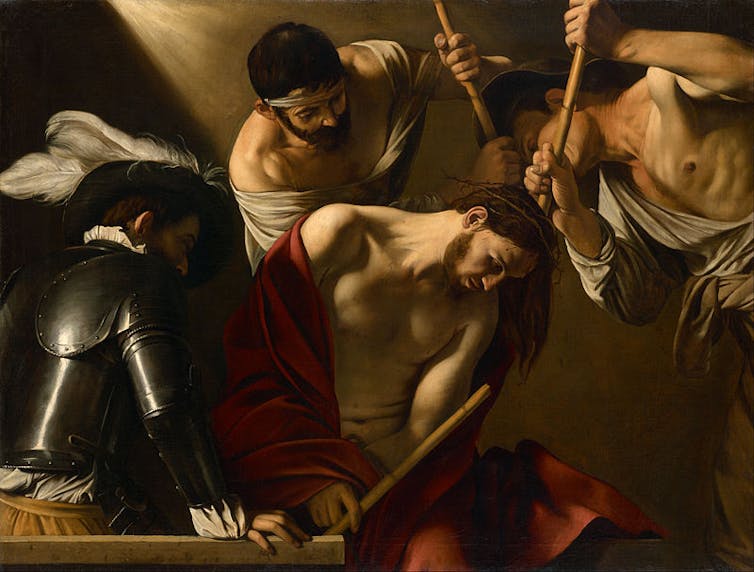The passion and the beauty: why Easter music will send a shiver up your spine
 Caravaggio Thomas Breeze, Cardiff Metropolitan University
Caravaggio Thomas Breeze, Cardiff Metropolitan University
For many lovers of choral music, Johann Sebastian Bach is the go-to composer at any time of year. But at Easter, his two settings of the Passion story – as told by St Matthew and St John – are monumental presences in any discussion of great Easter repertoire. A devout Lutheran who never had the globetrotting career or musical superstardom of his exact contemporary, Handel, Bach spent almost his entire career in the service of the Church.
One of his many commitments while Kapellmeister (master of music) in Leipzig was to compose a weekly cantata to be performed in church. On Good Friday, this cantata became a setting of the Easter story running to some two-and-a-half hours. It can only be imagined how long the actual service was that contained this masterpiece, given that a sermon would originally have been preached in the interval between the two parts.
In keeping with the ideals of Lutheranism, the settings’ libretti are written in the language of the people (German, in this case) – and in earthy, direct terms, rather than florid and inaccessible phrases. Bach was ensuring that even the ordinary person could fully understand and experience this most dramatic of stories. The St Matthew has a reflective, grand character, while the St John is more dramatic and anguished, leaving the listener to muse that Bach would have made an operatic composer to rival his countryman Handel, had his life taken a very different turn.
George Frideric Handel, of course, provided his own glorious tribute to the Easter season in the second and third parts of the Messiah, his most famous oratorio premiered in 1742. Strangely, the Messiah is now most often heard in the run-up to Christmas, and yet the majority of the work deals with the events of the Passion and Easter.
By the 1740s, Handel’s glittering career as an operatic composer was waning, with public taste moving away from these enormously expensive spectacles. Ever the impresario, Handel moved with the times and began to write oratorio.
The Messiah was a huge success from the start, and can be relied upon to this day to pack concert venues – though perhaps not to the extent of the premiere performance. On April 13, 1742, when the great and the good of Dublin gathered to hear the premiere of Handel’s masterpiece, concern about the capacity of the hall to meet demand was such that male patrons were requested to attend minus their swords, and their female companions to forgo the customary hoops in their dresses. This allowed an extra 100 audience members to squeeze through the doors.
Golden age
For a golden age of religious composition in England, we need to turn back to the turbulent Elizabethan period, when religious affiliation became quite literally a matter of life and death. Thomas Tallis, composer of the famous 40-part motet Spem in Alium, set the Lamentations of Jeremiah not for the sort of public performance that Bach’s works enjoyed, but for the private devotions of recusant Catholics. This gives the rich polyphony, with its suspensions and dissonances, an emotional depth and significance even beyond that provided by the liturgical season.
At the centre of the Easter story, with Jesus himself, is Mary, and the mother’s anguish expressed in the 13th-century words of the Stabat Mater have inspired many composers. How to choose between the multitude of settings that span hundreds of years? While Vivaldi eschews the Italianate fireworks for which his many concertos have made him justly famous, and presents a stripped-down setting for solo alto and strings, the Polish composer Szymanowski gives us a six-movement, half-hour work for soloists, choir and full orchestra that is full of earthiness and colour.
Fruits of guilt
For those music lovers who prefer to depart from the well-travelled routes and experience some less well-known Eastertide offerings, there are a couple of pieces that would reward the lover of fascinating music stories.
Carlo Gesualdo is hardly a household name as a composer, but his music tends to stay with the listener once discovered – the bizarre part-writing and tortured dissonances can lead the unwary to believe they are listening to 20th-century atonalism, but Gesualdo was in fact a prince who lived from 1566 to 1613. The source of his avant-garde compositional moments was a lifelong sense of guilt and torment at brutally murdering his wife and her lover on catching them in the act of adultery.
As a prince, he was able to evade justice for his crime, but the effect on his mind is, supposedly, the reason for the astonishing harmonic twists and leaps in his music. His Tristis est Anima Mea is a fine example of his tormented style dovetailing perfectly with the darker moods of Holy Week.
Mystery of Mozart and the Miserere
Gregorio Allegri’s setting of Psalm 51, Miserere Mei Deus, is instantly recognisable to most listeners, with its soprano soloist repeatedly soaring to a spine-tingling top C – all the more effective for the ethereal sound reverberating from the roof of the Sistine Chapel, the venue for which it was originally written, perhaps in 1638.
As befits a work written for such an exclusive setting, plenty of mysteries and legends surround the work – not least the story that its dissemination beyond the Vatican was banned on pain of excommunication (though this was probably just a rumour put around to discourage any attempts). The embargo was finally broken – so the story goes – by the 14-year-old Mozart who, on hearing the piece performed, went forth from the hallowed chapel and promptly wrote it down from memory. The fact that the piece consists of a number of repetitions of the same musical material does perhaps reduce the genius value of this particular feat a little.
However, the most interesting tale is how the famous top-C moment found its way into the piece in the first place, through a bizarre series of errors once the piece had made its way “into the wild”.
Perhaps the many musical offerings by composers throughout the centuries to the Easter story provide us with a valuable antidote to the teetering piles of chocolate that greet us at every turn in the high street at this time of year. The list above, while far from exhaustive, should provide a more nutritious Easter experience, for the soul at least.
Thomas Breeze, Senior Lecturer in Music Education, Cardiff Metropolitan University
This article was originally published on The Conversation. Read the original article.





















